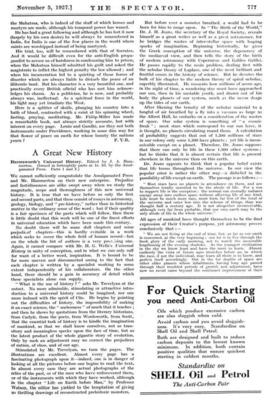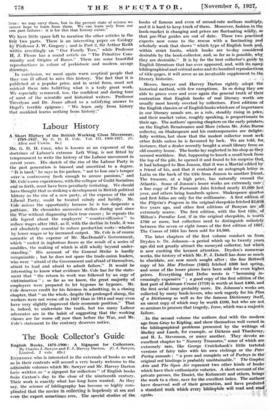A Great New History WE cannot sufficiently congratulate the Amalgamated
Press
and Mr. Hammerton on their new enterprise. Prejudice and fastidiousness arc alike swept away when we study the magnitude, scope and thoroughness of this new universal history. It is true that we have before us only the first and second parts, and that these consist of essays in astronomy, geology, biology, and " pre-history," rather than in historical matter in the ordinary sense of the word ; but if their quality
is a fair specimen of the parts which will follow, then there is little doubt that this work will be one of the finest efforts in universal education which have been made this century.
No doubt there will be some dull chapters and some prejudiced. chapters—this is hardly evitable in a work which seeks to cover the whole field of human record—but
on the whole the list of authors is a very proa.ising one. Again, it cannot compare with Mr. H. G. Wells's Universal History in unity of conception, and in what we can only call
for want of a better word, inspiration. It is bound to be far more uneven and disconnected owing to the fact that each chapter is written by a specialist working to some extent independently of his collaborators. On the other hand, there should be a gain in accuracy of detail which these specialists alone can supply.
" What is the use of history ? " asks Mr. Trevelyan at the outset. No more admirable, stimulating or attractive intro- duction to a universal history could be imagined, nor one more imbued with the spirit of Clio. He begins by pointing out the difficulties of history, the impossibility of making it an exact science, the " uselessness " of much that it teaches ; and then he shows by quotations from the literary historians, from Carlyle, from the poets, from Wordsworth, from Scott, that the essential task of history is to kindle the imagination of mankind, so that we shall know ourselves, not as tran- sitory and meaningless specks upon the face of time, but as the latest product of the whole gigantic story of evolution. Only by such an adjustment may we correct the prejudices of nation, of class, and of our age.
Stimulated by Mr. Trevelyan, we turn the pages. The illustrations are excellent. Almost every page has a fascinating photograph upon it—indeed, one is in danger of looking at all the pictures before one begins to read the text. In almost every case they are actual photographs of the
relics of the past, or of the men who have rediscovered them, or of the instruments with which they have worked, although in the chapter " Life on Earth before Man," by Professor Watson, the editor has yielded to the temptation of giving us thrilling drawings of reconstructed prehistoric monsters. But before ever a monster breathed, a world had to be born for him to range upon. In " The Birth of the World,"
Dr. J. H. Jeans, the secretary of the Royal Society, reveals himself as a great writer as well as a great astronomer, for he bridges the wastes of inter-stellar space with leaping sparks of imagination. Beginning historically, he gives the Greek conception of the universe, the degeneracy of the mediaeval view, and then tells the story of the birth of modern astronomy with Copernicus and Galileo Galilei. He passes rapidly to the main problem, dealing first with the nebular theory of Laplace, one of the most brilliant and fruitful errors in the history of science. But he devotes the bulk of his chapter to the modern theory of spiral nebulae, superbly illustrated. He recounts how millions of aeons ago, in the night of time, a wandering star must have approached our sun, then in his unstable youth, and drawn out of his body the planets of our system, much as the moon drags up the tides of our earth.
After likening the tenuity of the nebular material to a lungful of air breathed by a fly into a vacuum as large as the Albert Hall, he embarks on a consideration of the wastes of space. Our solar system is something of " a cosmic freak " ; most stars which correspond to our sun have, it is thought, no planets circulating round them. A calculation of probability suggests that out of 1,500 millions of stars in our colony only some 1,500 have planets ; yet life is incon- ceivable except on a planet. Therefore, Dr. Jeans supposes that there can only be life in these 1,500 other systems ; but he thinks that it is almost certain that life is present
elsewhere in the universe than on this earth. .
Dr. Jeans appears to think that a popular belief exists that life teems throughout the universe. In our view the popular error is rather the other way—a disbelief in the possibility of life except on earth. The passage is as follows ;—
" Most stars have no planets in attendance on them, and are themselves totally unsuited to be the abode of life. For a sun to support life is the exception : the normal sun eternally radiates energy away into endless space without affecting life of any kind. Life must be much more rare, must form far less of the total of the universe and enter less into the scheme of things, than was thought half a century ago. It is not altogether inconceivable, although very far from probable, that our own earth may be the only abode of life in the whole universe."
All ages of mankind have thought themselves to be the final expression of their Creator's purpose, yet astronomy proves conclusively that :— " We are not living at the end of time, but, as far as our earth is concerned, at the very beginning ; our lot is to live through the fresh glory of the early morning, not to watch the inexorable lengthening of the evening shadows. As the youngest civilization in the sky we know least and have the most to learn. Almost endlessly the vista of future ages stretches before us, in which the race, if not the individual, may learn all there is to know, and perfect itself accordingly. Out in the far depths of space are other older planets whose inhabitants, having long ago passed through their troubled periods of growth and adjustment, have now no racial cares beyond the continued improvement of their lives : we may envy them, but in the present state of science we cannot hope to learn from them. We can learn only from our awn past failures : it is for this that history exists."
We have little space left to mention the other articles in the first 'two parts. There is an interesting paper on GeOlogy by Professor J. W. Gregory ; and in Part 2, Sir Arthur Keith writes arrestingly on " Our Family Tree," while Professor H. J. Fleure has a sound article on " The Primitive Com- rannity and Origins of Races." . There are some beautiful reproductions in colour of prehistoric and modern sayage ditiwings.
In conclusion, we must again warn sceptical people that they can ill afford to miss this history. The fact that it is published at a popular price, and in serial form, must not mislead them into belittling what is a truly great work. We especially ccmmend, tco, the confident and daring tone- of most of the scientific and historical writers. Professor- Icevelvan and Dr. Jeans afford us a satisfying answer to Hegel's . terrible epigram ; " We learn only from history that mankind learns nothing from history."



















































 Previous page
Previous page